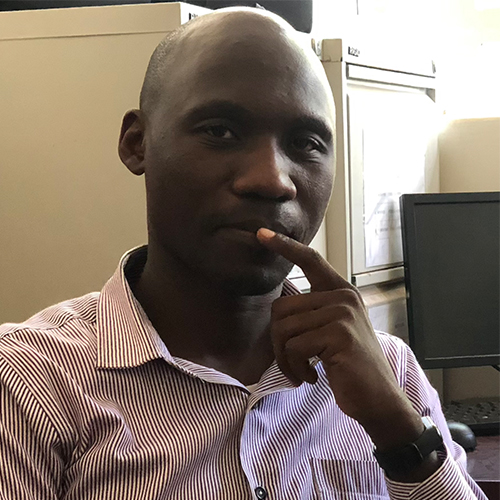
Gerald Mboowa
Country (Nationality)
Uganda
Grantee Title
Understanding transmission dynamics and acquisition of Antimicrobial Resistance at referral hospitals and community settings in East Africa
Grantee Description
Bioinformatics & Genomics Research Fellow,
College of Health Sciences, Makerere University (MakCHS).
Gerald works with the MakCHS as a Research Fellow. His Ph.D research focused on identifying host functional genetic loci that are important in pediatric HIV/AIDS disease progression in sub-Saharan Africa populations. This work was funded by United States’ National Institutes of Health (NIH) through the Collaborative African Genomics Network (CAfGEN) of the H3Africa consortium (NIH Grant #: 1U54AI110398) and the DELTAS Africa Initiative Grant #: DEL-15-011 through the Training Health Researchers into Vocational Excellence in East Africa (THRiVE-2).
Gerald started his research career with a lot of wet-lab work but has over time transitioned to applying bioinformatics tools to analyse genomics data generated from exploring microbiological questions particularly those pertaining pathogen typing genomic characterization and antimicrobial resistance (Computational microbiologist). Gerald formulates hypotheses, runs experiments as well as analyses, trouble-shoots these analyses, and does interpretation of the same.
Project - Understanding transmission dynamics and acquisition of Antimicrobial Resistance at referral hospitals and community settings in East Africa
This study will combine conventional microbiology methods, whole genome sequencing, as well as social and behavioral sciences-based methods and, a combination of both longitudinal and retrospective study designs to generate knowledge with the potential to transform our understanding of the local and global emergence and spread of antimicrobial resistance especially in hospitals and community settings. This study will also elaborate the acquisition and transmission dynamics of antimicrobial resistance between communities or within communities over time. Furthermore, this project will also provide an ecological perspective that can integrate environmental monitoring of antimicrobial resistance in community settings with monitoring of antimicrobial resistance in the hospital settings. In addition, the study will also expand the available primary data in regards the understanding of the global antimicrobial resistance epidemiology, will contribute towards improving infection control in hospitals and community settings as well as provide potentially leverageable opportunities to build in new ways on existing public health interventions and/or antimicrobial resistance monitoring platforms.
